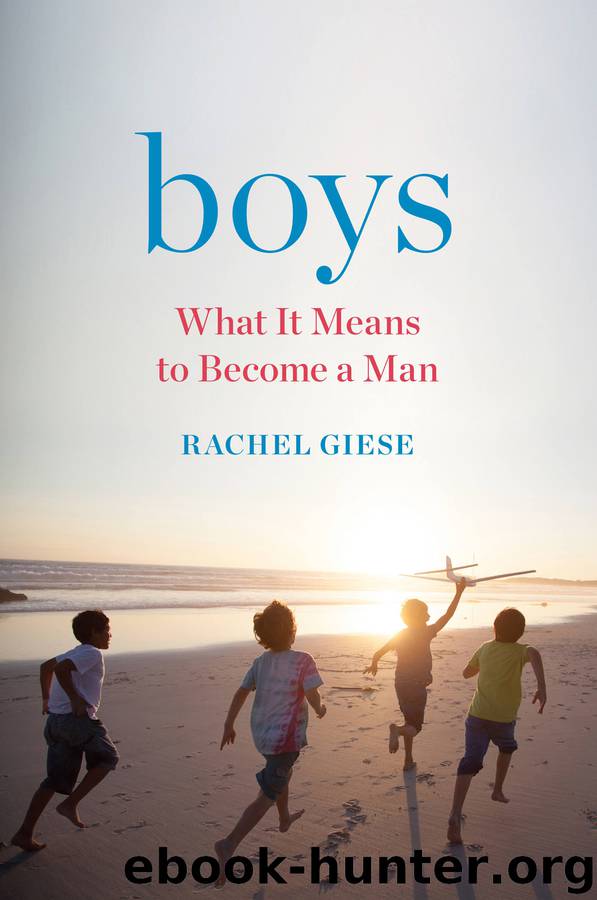Boys: What It Means to Become a Man by Rachel Giese

Author:Rachel Giese
Language: eng
Format: epub
Publisher: Seal Press
Published: 2018-12-11T00:00:00+00:00
Modern team sports, the ones we recognize now as soccer, baseball, football, rugby, basketball, and hockey, began to take their current forms in the 1800s. One of the main instigators for the popularization of sport was, strangely enough, a novel about religious values. Thomas Hughes’s influential 1857 novel, Tom Brown’s School Days, was set at an upper-class all-boys British boarding school, and its central theme is the transformation of rowdy boys into respectable Christian men. Pious message aside, it was Hughes’s characterization of sports that caught on: descriptions of bare-knuckle boxing, rugby and running, and his emphasis on the virtues of physical strength, teamwork, and cooperation. What readers took away was a vision of young manhood that was fearless and rugged, forged on the playing field alongside one’s loyal teammates.8
The formalization of sports as a morally healthy pastime for boys was helped along by Victorian squeamishness about sex. Boys’ sexual desires were seen as disruptive and dangerous. Sports, especially when twinned with values like honor and duty, were thought to provide an outlet for sexual urges, as a way to exhaust or sublimate them, especially at boarding schools, which were rife with same-sex crushes and affections. Of course, with all the male bonding in the locker room and grappling out on the field, this didn’t exactly work, and the tension between male intimacy and homophobia has bedeviled sports ever since.
Initially, sports were primarily activities for socially superior boys (that is, white, Christian, and upper class). By the late nineteenth century, rugby, rowing, and cricket had become the marker of a well-cultivated young man. So much so that at the time, a notice on the wall at the ultraposh British boys school Eton College read: “Any lower boy in this house who does not play football once a day and twice on half holiday will be fined half a crown and kicked.”9 At the same time, in North America, Europe, and elsewhere, soccer, hockey, lacrosse, track and field, and boxing were being formalized with rules, clubs, and teams.
For working-class boys, boys in British colonies, and black and indigenous boys in Canada and the United States, sports had a different goal. The Victorian belief in amateurism—that is, not receiving payment for playing sports—shut out all but those who were wealthy enough to play organized or club sports for free and receive training and coaching at school or college. (The class discrimination baked into the idea of amateurism continues in sports even now, amid the growing calls for college athletes—who make considerable sums of money for their schools and whose talents help fatten endowments—to be paid for their work.) Working-class and black and brown boys and young men were admitted into organized sports initially as a way to socialize them and to impress upon them the power structures of the day. Sports were coached and officiated by white adult men through charitable organizations. The YMCA, for instance, was founded in London in 1844 by an evangelical Christian named George Williams, who wanted to
Download
This site does not store any files on its server. We only index and link to content provided by other sites. Please contact the content providers to delete copyright contents if any and email us, we'll remove relevant links or contents immediately.
| Early Childhood | Parenting Boys |
| Parenting Girls | School-Age Children |
| Single Parents | Teenagers |
The Lost Art of Listening by Michael P. Nichols(7488)
Rich Dad Poor Dad by Robert T. Kiyosaki(6603)
We Need to Talk by Celeste Headlee(5608)
I Love You But I Don't Trust You by Mira Kirshenbaum(3859)
The Complete Idiot's Guide to Coping With Difficult People by Arlene Uhl(3145)
Rich Dad Poor Dad: What The Rich Teach Their Kids About Money - That The Poor And Middle Class Do Not! by Robert T. Kiyosaki(2947)
A Burst of Light by Audre Lorde(2597)
The Book You Wish Your Parents Had Read (and Your Children Will Be Glad That You Did) by Philippa Perry(2508)
Dealing with People You Can't Stand by Dr. Rick Brinkman(2456)
Life Hacks by Dan Marshall(2448)
An Odyssey by Daniel Mendelsohn(2305)
The Expectant Father by Armin A. Brott & Jennifer Ash(2267)
Teach Your Child How to Think by Edward De Bono(2155)
No Time to Say Goodbye(2111)
What I Need by J. Daniels(2075)
The 7 Habits Of Highly Effective Teens by Covey Sean(2063)
The Out-of-Sync Child by Carol Stock Kranowitz(2041)
The Anxious Generation by Jonathan Haidt(2011)
I Don't Belong to You by Keke Palmer(1986)
